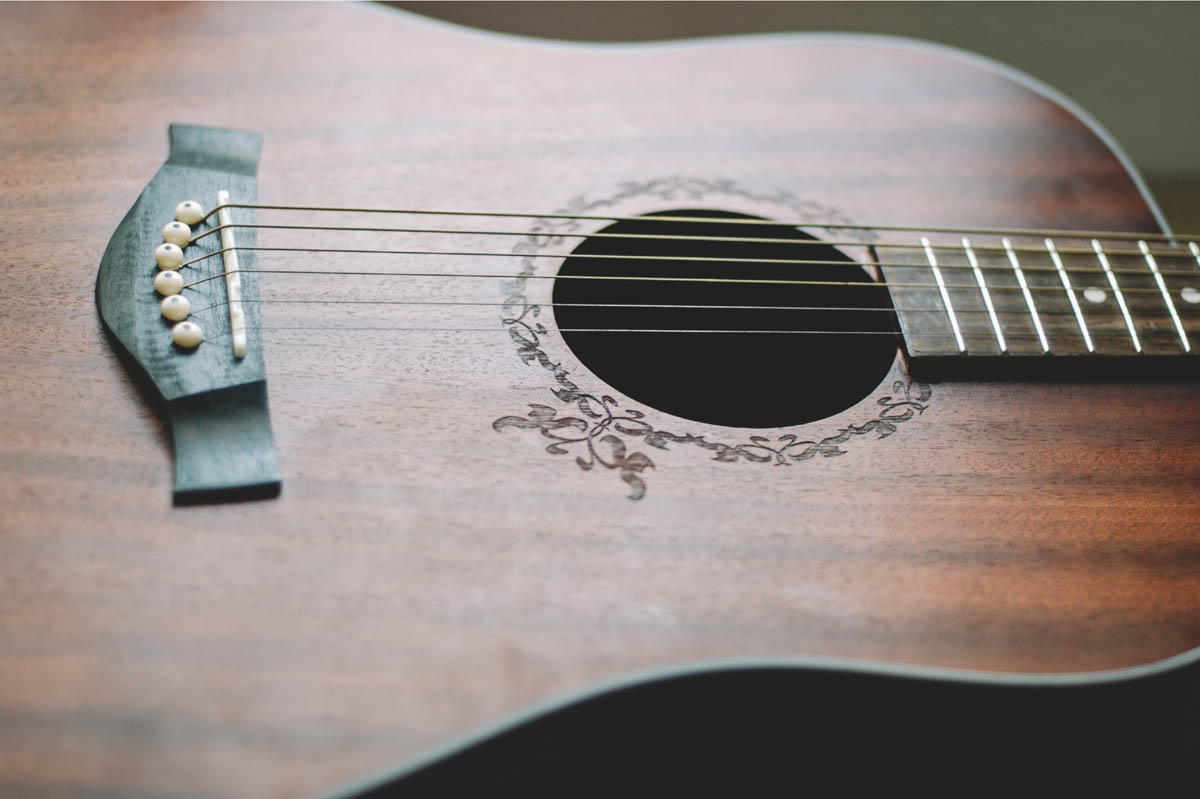Do Acoustic Guitars Get Louder With Age? (Investigated)
Have you ever played an aged (maybe even vintage) guitar, and been wowed by the tone and volume of the instrument compared to your newer guitar?
You might be wondering “will my current acoustic guitar get louder with age?”
This is not a straight-forward question to answer as there are many different parts of the guitar to consider, along with the quality of the wood used, the glue and finish on the guitar, and the setup.
Some players claim that their guitars have become louder with age, usually coming down to the tonewood used in the construction, the environment the guitar has been kept in, and how often and well the guitar has been played.
We’re going to dive a bit deeper into this topic and see if we can discover the elusive answer to this question.

Do Guitars Become Louder With Regular Playing?
Acoustic guitar players often comment that a guitar left unplayed for a long time will not sound as loud as when it is regularly played.
As a guitar ages and it is played regularly many players say the guitar becomes ‘played in’, which is another way of saying that the instrument has matured.
There may be some merit to this, as over time a guitar under the constant tension of strings may find its sweet spot of tension vs resistance, and resonate more boldly.
Some of the early jumbo guitars were made to compete on volume with other big band instruments, and are renowned for their volume compared to many guitars today. Find out what you didn’t know about jumbo guitars.
Wood Resonance and Sound Volume
The first thing to consider is the tonewood that a guitar is made from, particularly the soundboard.
When strings vibrate on a guitar, the vibrations are transferred into the body of the guitar which resonates in harmony with the strings – the soundboard in particular.
When strings vibrate they don’t make much sound as they slice through air, and so the energy needs to be transferred into the guitar body so that there is a conversion of energy from vibration to sound.
Well crafted guitars with good quality soundboards will convert the string energy more efficiently than cheap guitars with poor resonant properties.
The larger the soundboard and the more it resonates, the louder the sound of the vibrating strings is amplified – although to be exact, a guitar body doesn’t amplify sound in the technical sense of amplification.
Sound is heard when then soundboard resonates back and forth creating air pressure variations we know of as soundwaves, and the soundhole allows the movement of air in and out of the guitar body.
Spruce is commonly used for guitar tops since it is reasonably stiff, but with the right amount of flexibility to resonate well. The natural resonant frequencies of the guitar top are largely what defines its tone.
A cheap guitar with a plywood top sounds very boxy and not as loud as a solid tonewood top guitar since the laminated sheets of wood make plywood very stable and stiff, so it doesn’t resonate well.
What Changes Occur With Aging Wood?
Wood is different to many other building materials, and after harvesting and drying it still retains dynamic properties such as expanding and shrinking according to the amount of humidity in the air.
Some people think the wood in a guitar will continually dry with age. However, this isn’t the case as the exposed wood surfaces (mainly inside the guitar) will allow the wood to absorb a certain amount of water.
Wood gains or loses moisture until the water it contains balances the water in the atmosphere around it. This is known as the equilibrium moisture content (EMC).
So the process will continue indefinitely unless the humidity is kept constant.
Why Aged Wood Can Resonate Differently
Many guitarists state that spruce is known to ‘open up’ with age and produce better tonal qualities and a louder acoustic guitar.
Why is this?
What does ‘open up’ mean in terms of aged wood, and where does moisture fit into this?
Wood contains cells that are shaped like tubes, and these hollow cells absorb moisture. There is evidence to suggest that over a long period of time these cells tend to collapse, and the wood then absorbs less water.
This results in more stable wood with more lightness and stiffness and gives improved soundboard resonance.
Presuming the other components of the guitar work well with the top you will see improved tone (and possibly louder volume also).
The guitar neck is also crucial when it comes to the sound properties of a guitar and having a stiff neck with deep tonal qualities improves the sustain and overall tone.
If you have improved sustain then possibly a listener may perceive this as louder, although this would be subjective.
Improved Tonewood Resonance = Louder?
The hope we all have for an aging guitar is that its tone will improve, and the basic requirement is good quality tonewood and construction right from the start.
A poor sounding new guitar is highly unlikely to sound better many years later, as it’s probably made from inferior materials and with lower craftsmanship.
All being equal, if the resonance of the wood improves with age then the frequency response will be improved through lows to highs, giving a more balanced voice to all frequencies.
If frequencies that were formerly low in volume now have increased presence, then you could surmise that the sum of all the frequencies will now produce a louder sound.
This is more hypothesis than fact, however may explain why some guitars may appear to the casual listener to be louder over an extended period of time.
How The Moisture Content of the Wood Affects Tone
An experiment was conducted on spruce to determine how it responded to different vibrational frequencies according to differing water content levels.
The finding essentially pinpointed that higher moisture content results in lower resonant frequencies in spruce.
This means that as a spruce guitar soundboard becomes drier, you will likely hear more definition of high tones from the guitar.
 Charts of changes in frequency, by Herz and Cents, of Spruce planks.
Charts of changes in frequency, by Herz and Cents, of Spruce planks.
Figure 2.4 from “Vibration Testing for the Evaluation of the Effects of Moisture Content on the In-Plane Elastic Constants of Wood Used in Musical Instruments” by M. A. Pérez Martínez, P. Poletti, and L. Gil Espert
This could lead a listener to believe the sound was louder if sitting directly in front of the guitar since higher pitched sounds are more directional.
Keep in mind that based on our earlier observations wood is hygroscopic (can absorb water) so the tones heard can vary according to the atmosphere the guitar is subjected to.
Studies have shown that most guitars tend to have three strong resonances in the 100-200 Hz region, and higher frequency modes have weaker resonances.
This would lead us to believe that the higher frequencies produced by drier aged wood may add ‘color’ to the sound, but not actually make the sound louder.
Saddle and String Height Changes vs. Volume
It’s possible over time that the pin holes on the bridge will naturally develop slots over time from the pressure of the strings on the edge of the holes.
If slots develop then this will cause the strings to sit deeper where they enter the pin holes, so increasing the break angle over the saddle.
- An increased break angle increases tension into the bridge which causes more vibration transfer into the soundboard, and so sound volume may increase.
Another thing that is known to increase volume is higher string action on a guitar, as this places more torque (twisting effect) on the bridge and will transfer more string energy into the guitar top.
- As a guitar ages it may have a tendency for the neck to bow upward more, and also for the soundboard to warp upward which effectively raises the string height.
If an aged guitar has suffered these changes without being corrected by a luthier, then it is possible that the volume will have increased.
Does the Guitar Finish Affect Sound Volume?
The more you play a guitar over many years, the further you will wear down the thickness of the finish over the wood.
It’s well known that a thick finish on an acoustic can stifle the sound, so it would make sense that as the finish becomes thinner the sound volume could increase through improved resonance of the soundboard.
The Conclusion On Aged Guitars – Do They Really Get Louder?
We have discussed many different aspects of acoustic guitars here, from what happens with aged wood, to moisture content, to the effects of regular playing.
Although we can point to a few scientifically proven facts, many points that we consider are not proven in the real world and are subjective conversations.
We have reasonable assurance that aged wood has less ability to absorb water, and drier spruce resonates at higher frequencies – this affects the tone of acoustic guitars.
Along with changes in string break angle at the saddle, high action due to neck warping, and a thinning finish there may be merit in aged guitars sounding louder.
Everything of course is subjective especially lacking any direct controlled experiments, and an aged guitar may just sound louder to a listener sitting in a particular position where they hear certain tones more clearly.
Resources
https://newt.phys.unsw.edu.au/music/guitaracoustics/modes.html




